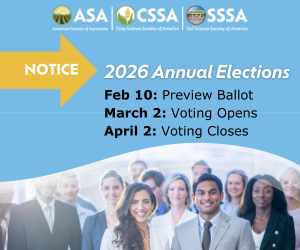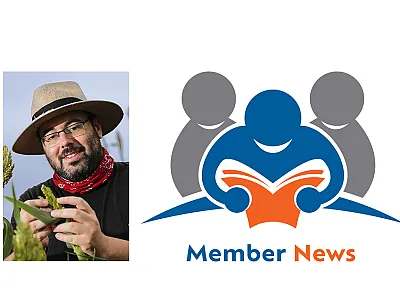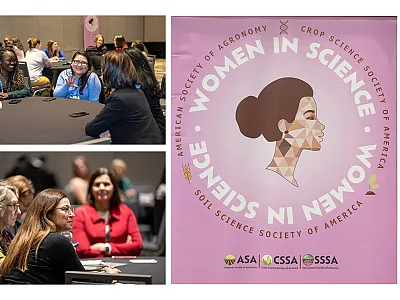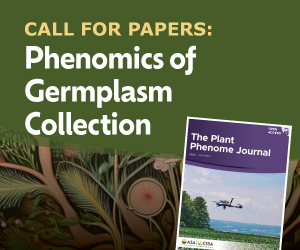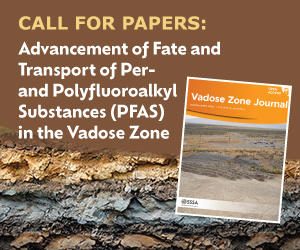Our Tri-Society Meeting: International, Inclusive, Inspiring
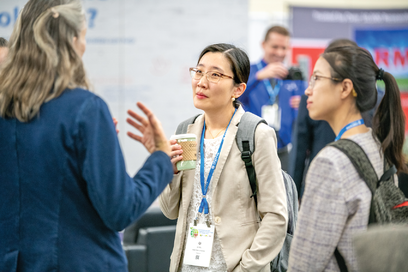
Greetings! We are deep in a busy time leading up to our Annual Meeting. Students and researchers alike are occupied with experiments, data collection, statistics, and models. These days, you may be fine‐tuning your abstract, thinking about a good “hook” for your talk, or working on graphics for your poster.
When preparing to give a scientific presentation, many of us turn to the internet for advice. A search for “great scientific talk” or “prize‐winning poster” will reveal links to websites, blogs, photos, and videos with advice, hints, and opinions. The authors of these helpful missives will invariably tell you to avoid jargon. This is reasonable. We all know that jargon is highly technical and only specialists will understand it. On the other hand, jargon is a time‐saver because it allows you to state your meaning in a short phrase or with an abbreviation.
Consider the name of our Annual Meeting. Officially, it is the International Annual Meeting of the American Society of Agronomy, Crop Science Society of America, and Soil Science Society of America. Whew! I had to stop for breath after saying the whole name. For simplicity, we can refer to the event as the ASA, CSSA, and SSSA Annual Meeting although others may wish to be even more succinct and call the meeting after one of the sponsoring Societies. For example, one might say “I am attending the ASA Annual Meeting.” This suggests that the person is going to participate only in the ASA‐sponsored sessions. Of course, your registration fee allows you to freely attend any session you like at the meeting.
However, it does not matter whether the session was organized by a section, community, or division of ASA, CSSA and SSSA—all registered participants are welcome. Furthermore, all registered participants are invited to events that are jointly sponsored by two Societies and to plenaries hosted by all three Societies. If you would like to tweet or tag meeting content on social media, please use the hashtag #ACSmtg, so it connects to our sponsoring Societies—ASA, CSSA, and SSSA.
Since three Societies are inviting you to their joint meeting, it is also sometimes referred to as the “Tri‐Society” meeting. I like that jargon. The term Tri‐Society acknowledges that the meeting includes everyone from three Societies: ASA, CSSA and SSSA. It feels inclusive.
I have also heard participants refer to the meeting by the theme, but this is rare because the meeting theme changes every year. The themes are always interesting and relevant. Do you know the theme of this year's meeting? It's “Open Science Inspires.” I am really looking forward to the planned activities, which are sure to inspire!
I am also inspired by the tremendous number of agronomic scientists I meet outside of the United States who know about and have attended the Tri‐Society meeting. It is remarkable!
A Highly Attractive Meeting for International Agronomists
In an earlier issue of CSA News magazine, I mentioned that I am on leave from McGill University (Montreal, Canada) and am spending my sabbatical in North Africa at UM6P, the Mohammed VI Polytechnic University in Ben Guerir, Morocco. This has been a great opportunity to meet agronomists from all over Africa as well as those visiting from Europe, South America, and Asia. I have met dozens of international agronomists who spontaneously shared their happy memories of the Tri‐Society meeting. Some attended the meeting when they were graduate students or postdoctoral fellows in the United States. Others have been ASA members for years, maintaining a close connection with their favorite ASA section or community. For these individuals, being an ASA member is a way to stay connected to the latest agronomic developments and news from the United States and take advantage of professional development and continuing education opportunities.
The Tri‐Society meeting remains highly attractive to international agronomists. Many speak in glowing terms about the quality and originality of speakers at the meeting. They relive the excitement and thrill of meeting the giants of agronomic science, who generously shared their knowledge and perspectives at Tri‐Society events. International agronomists have recounted special career highlights from the Tri‐Society meeting—their first scientific poster, their first scientific talk, and their first scientific prize. The Tri‐Society meeting tends to be longer than other scientific meetings, but a four‐day meeting is the right amount of time for international agronomists to meet and build rapport with U.S. scientists, who they may only meet face‐to‐face once a year. Community activities like the opening and closing receptions are considered as a big plus, and the exhibits are always impressive at the Tri‐Society meeting.
Fewer international agronomists attended recent Tri‐Society meetings due to the public health situation. Fortunately, some were able to access the limited virtual meeting, which will be offered again this year. We are hoping to move ahead and significantly increase the in‐person participation of our international colleagues. To those who could not join for the past couple of years—we missed you! There is still time to register (acsmeetings.org/register) with early‐bird rates in place until September 20. Please pIan to join us from October 29 to November 4. I sincerely hope to see you again in St. Louis!
Financial Considerations
All ASA members benefit from a reduced registration fee at the Tri‐Society meeting. However, ASA recognizes that international agronomists may have difficulty to keep up their membership when they leave the United States. To provide an equal opportunity and include agronomists who would like to keep participating, ASA, CSSA, and SSSA created a special membership category. Eligible scientists can apply for a 70% discount when they are residents, citizens, and currently living in a country defined as having low and lower middle income by the World Bank. Students and scientists with very limited means can apply for additional financial support through the Agronomic Science Foundation (ASF) International Member Program. For more information, please visit the website at agronomy.org/membership/discounts.
If you know of a colleague who would love to keep up their ASA membership but is being held back by financial considerations, please let them know about the special membership program. This is another way that ASA is trying to make our agronomic science more accessible, everywhere in the world. If you have questions, contact Lauren McCann at 608‐268‐4952 or lmccann@sciencesocieties.org.
Please do not hesitate to contact me and the other members of your ASA Board of Directors, as well as your section and community leaders, with your ideas, stories, comments, questions and concerns. We look forward to hearing from you!
Text © . The authors. CC BY-NC-ND 4.0. Except where otherwise noted, images are subject to copyright. Any reuse without express permission from the copyright owner is prohibited.



